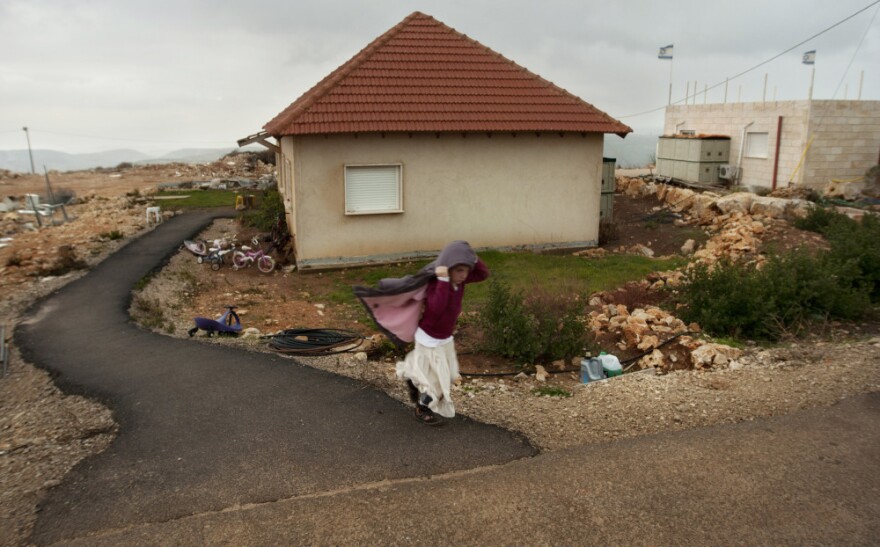In many American Jewish families, Israel is an extremely difficult subject to talk about. Generational and political divides have stalled discussions about the occupation of the West Bank in numerous households.
On Tuesday's Fresh Air, we talk to journalist Peter Beinart about his book The Crisis of Zionism, which argues that Israel cannot be a true democratic state as long as there are settlements in the West Bank, where Jews are citizens of the Israeli state and Palestinians are not. In his book and in a recent New York Times op-ed, Beinart has proposed a boycott of goods made in the Jewish settlements in the West Bank.

Many American Jews think this is a misguided idea. Among them is journalist Gary Rosenblatt, the editor and publisher of the The Jewish Week of New York, who monitored the reaction to Beinart's piece.
"I think to a certain degree he jumped the shark with that op-ed piece in The Times," Rosenblatt tells Fresh Air's Terry Gross. "I think if he was appealing to the mainstream or establishment Jewish community, many of whose members have conflicted feelings about the settlements, I think the proposition of a boycott just went too far and the reaction was pretty negative."
Rosenblatt says he agrees with Beinart that Israel can never be a fully democratic state as long as there are an occupation and settlers in the West Bank as there are now.
"But I disagree with his approach in that I think he started with a thesis and he's made the facts fit in. And if they don't fit, he ignores them or refutes them," he says. "I think Peter makes the Israel-Palestinian conflict look very simple. And I think it's really a much, much more complicated and nuanced situation. I think Israel's real problem is dealing with people who don't want a Jewish state in the region."
Rosenblatt says that Israel would be entirely democratic if it wasn't at war or under various forms of continuous attack.
"I'm weary of anyone on the left or the right who sees the Arab-Israeli conflict as one with simple solutions," he says. "I think Peter proposes basic, simple solutions. I think it's far more complex and that Israel's only enemy isn't Israel — it's the people surrounding them who reject the idea of having a Jewish state in the region."
Interview Highlights
On the tension between Israel being a Jewish state and a democratic state
"I think that tension is what we've been talking about in terms of a vibrant democracy and also being a Jewish state where the government is supportive of a Jewish state, for not only the people of Israel but also Jews all over the world, and how does one treat a minority within the state? A Christian minority, an Arab minority? And how does one fulfill the Declaration of Independence and all of those ideals, [while] at the same time recognizing that since the day the state was declared, Israel has been in a state of war and people who are under siege and in a state of war sometimes have to respond differently than they would like than a state that doesn't have that situation."
On the occupation
"I think in hindsight, it's a reasonable way of looking at things, as saying, 'Maybe this wasn't the best idea,' but that's looking 40 years back. It seemed like a great idea to many people of establishing facts on the ground. I think the ways wars are waged now has changed some of that equation. I think that's part of the problem. You don't have armies meeting on a battlefield. You now have people dressed as civilians either blowing themselves up in the middle of civilian areas or shooting rockets at civilians in Israel from Gaza and surrounding themselves around civilians — children, schools, hospitals — and counting on the fact that Israel has a moral impulse on the part of its army and is reticent about firing back."
Yes, the left is correct about Israel never being a fully democratic country as long as there's an occupation. But I think the right is correct in saying that solving the settlement issue won't solve the larger Arab/Israeli conflict.
On what the left thinks vs. what the right thinks
"Yes, the left is correct about Israel never being a fully democratic country as long as there's an occupation. But I think the right is correct in saying that solving the settlement issue won't solve the larger Arab-Israeli conflict."
On the difficulties Jewish people in America face in talking about Israel in their own families
"I've talked to a number of rabbis in the community from various denominations who tell me that of late, talking about Israel in the sermon is the third rail, as one [of them] described it. They just don't want to go there [because] it is such a contentious issue. I think that's unfortunate. Part of it is a lack of real knowledge about what's going on in Israel, and reading American press that tends to see things in simplistic terms about the situation there. And it's a combination of guilt and belief and lots of strong emotional pulls and ties and how people respond."
On guilt
"I think American Jews realize that we are essentially on the sidelines as spectators in this great drama. In our lifetime, we have this miracle of the modern state of Israel, and we're over here in the Diaspora, in America, watching as Israelis put their lives on the lives and have suffered in wars and many other ways. Whether we say it out loud or not, it's like, 'Who are we to criticize Israel when we're over here?' "
Copyright 2022 Fresh Air. To see more, visit Fresh Air.


